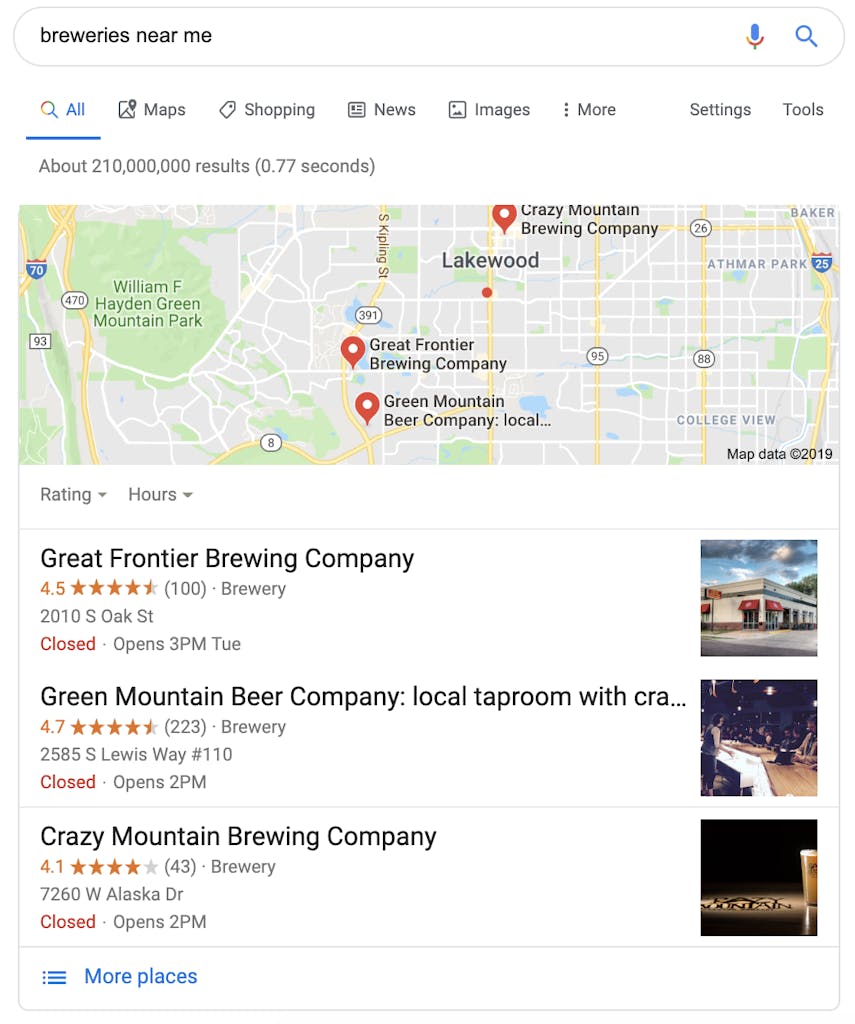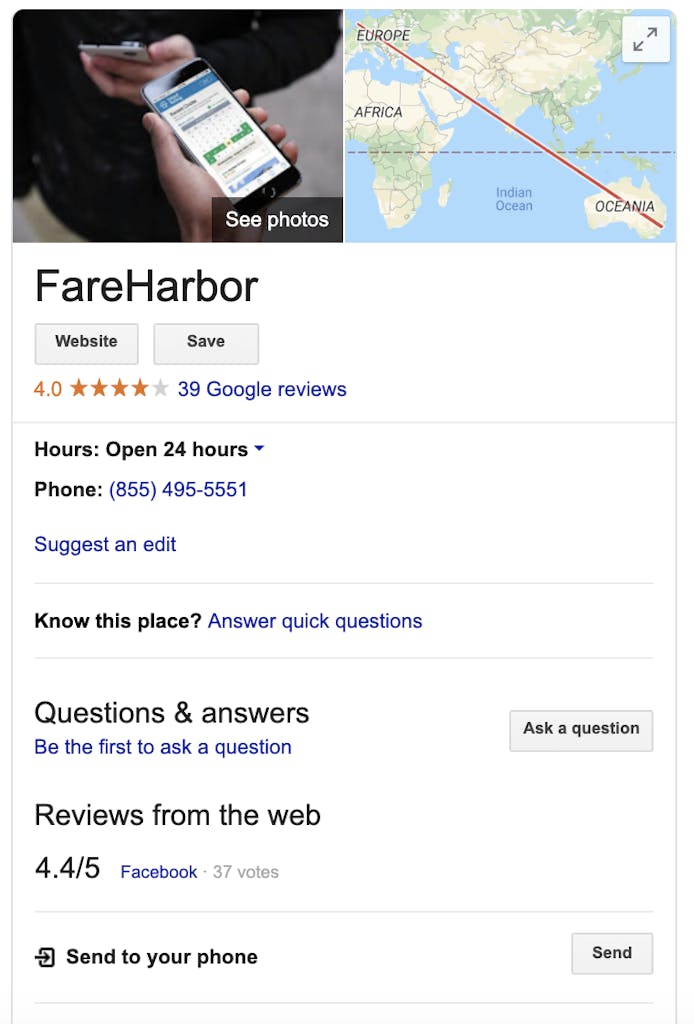- 7 minutes
- COVID-19 Resources
- Local Strategies
- SEO
- Websites
Beginner,
Intermediate
Get a behind-the-scenes-look into FareHarbor's 2024 season

Local SEO is absolutely crucial for small businesses and brick-and-mortar businesses to be discovered online. In fact, according to SEO Tribunal, 97% of people learn more about local businesses online than anywhere else. This is because searchers turn to online reviews, social media profiles, and online directories to find out more about a local company before deciding to do business with them.
Search engines understand that searchers want results that are relevant to them, and proximity is highly relevant to a local search. Local SEO is all about serving up the best services near the searcher. This is particularly important in the travel industry because vacationers look for activities near where they are staying and often rely on search engines to make the best recommendations in an unfamiliar area.
To ensure your company rises to the top of a local search, you need to optimize your site for this specific purpose. This guide will give you an idea of how local SEO will help customers find you.
Imagine that it’s your first morning in Lahaina, Maui, and you’re ready to pick up a surfboard rental and hit the waves. Your Google search might look a little something like “surfboard rentals in Lahaina” or “surfboard rentals near me.” In this scenario, you only need search results within a few miles of your location, and you want the search results to show you reviews, hours of operation, and other important information about the businesses you have to choose from.
This is where local SEO comes in. By optimizing your business for local searches, Google can serve up your business to searchers who are in your area and ready to book a tour or activity today. According to GoGulf, 46% of all Google searches are for local information. And these searches lead to real results for local businesses; 72% of people who performed a local search then visited a local business within 5 miles (HubSpot). Unlike many other types of searches, local search is specifically oriented towards those who are looking for something here and now. Having a local SEO strategy leads these types of searchers to your business quickly.
Don’t just take our word for it — here are a few stats from Search Engine Journal that show the importance of local search:
A local search typically includes terms such as “near me” or has the city name in the query. It might look something like this:
According to Chat Meter, searches including terms like “near me” or “close by” grew by more than 900% over two years. It’s clear that localization is becoming a vital element of SEO.

Local searches often happen on mobile devices, especially in the travel and tourism industry. Travelers use their smartphones or tablets to search for things to do in the city they’re visiting. These mobile searches lead to business for local companies — according to Nectafy, 88% of searches for local businesses on a mobile device result in a call or visit to the business within 24 hours.
You might be wondering where your company will appear in local search results when you optimize your website for local SEO. The short answer is everywhere. More specifically, you typically see local businesses in the Google Local Pack, Google My Business profiles in the Knowledge Panel, and citations. Let’s dive into the anatomy of local SERPs and how they help your business.

When you do a local search like “breweries near me,” the SERP feature you see at the top of the search results is called the Local Map Pack. This feature displays a map of the city, with pins showing the locations of the nearby businesses, followed by the top three businesses that match your search (you also have the option to expand the list).
This SERP feature displays contact information, hours of operation, and user reviews, which are crucial factors that a searcher considers when selecting a local business. The Local Map Pack is especially important for mobile searches. Travelers are likely to do local searches on their phone, and the Local Map Pack can put your business front and center and makes it easy for them to book with you fast.
When performing a local search, 92% of searchers pick businesses on the first page of local search results. The Local Map Pack dominates the first page of search results, so it’s the optimal place for a local business to be. Optimizing your site for local SEO improves your chances of appearing in the map pack, leading more searchers to your business.
 Google My Business is a business listing that displays your company’s information — including location, contact information, and user reviews — across various Google features and platforms. Your GMB account allows you to ensure that customers are getting the most detailed, accurate information about your business when they encounter you in online searches, and it’s one of the most important factors in your local SEO strategy. Check out our guide on how to set up and optimize your GMB account.
Google My Business is a business listing that displays your company’s information — including location, contact information, and user reviews — across various Google features and platforms. Your GMB account allows you to ensure that customers are getting the most detailed, accurate information about your business when they encounter you in online searches, and it’s one of the most important factors in your local SEO strategy. Check out our guide on how to set up and optimize your GMB account.
The information on your GMB profile is pulled into all kinds of SERP features on Google, including Google Maps results, the Knowledge Graph (the panel displayed on the upper, right-hand corner of the SERPs page when you search for a company by name), the Local Map Pack, and more. This is why it’s important to ensure the information on your GMB profile is accurate, up-to-date, and comprehensive.
When performing a local search, searchers tend to gravitate to businesses that have a robust GMB profile, including reviews and photos. According to Google, businesses with photos on their profile receive 35% more clicks to their website and 42% higher requests for driving directions in Google Maps. Additionally, businesses appearing in the top three spots of the Local Map Pack have an average of 47 Google Reviews (BrightLocal). Optimizing these and other elements of your GMB profile will ultimately get you more organic traffic from local searches.
Citations are made up of any online directory where your company’s listing appears with NAPW data (name, address, phone number, website URL). Popular directories such as Yelp, Yellow Pages, and Tripadvisor as well as local directories are vital for your SEO strategy, giving searchers plenty of places to find you on the web. They also generate links to your site, which signals to search engines that yours is an established, trustworthy business.
Directory listings generate trust in users. According to BrightLocal, 80% of consumers lose trust in a business if they see inconsistent or incorrect information online. You certainly don’t want to lose customers who go to an incorrect address or call an old phone number for your business because your citations are out of date. Keeping your citations consistent and up-to-date is easy, can be done quickly, and is a huge factor in helping you rank in local searches. Learn more in our guide to local directories.
Now that you understand the importance of local search and the difference it can make to your business, you’re ready to start optimizing your website and directory listings to ensure you appear in relevant local searches that will drive business to your company. Here are the elements you want to work on:
Local SEO should be at the top of your mind when it comes to your SEO strategy. As search engines become smarter and understand that searchers want local results that are relevant and useful to them, local SEO will continue to become a more important factor in organic traffic. Check out our video guide on how to use local SEO to grow your business.